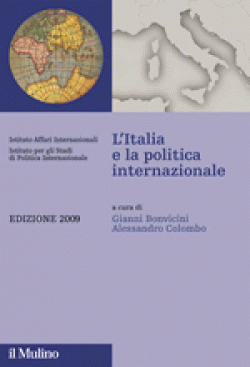L'Italia e la politica internazionale. Edizione 2009
The tenth edition of the yearbook put out by the IAI and ISPI deals with international developments in 2008. Much of the volume analyses the three major events of the year from different points of view: the diplomatic and military crises between Russia and Georgia and between Israel and Palestine, the change in the US presidency with the election of Barack Obama, and the devastating crisis that first struck the financial world and then swept though the international economy. But the real unifying theme of this edition of the yearbook is the crisis (revealed by all these events) of multilateralism and the major international economic and security organisations.
With respect to former editions, this one also devotes more attention to Italy’s foreign policy. In addition to reflecting generally upon the policy lines of the new government, it examines specific subjects such as developments in relations with Russia, the new partnership in Europe, positions on climate and energy and the new chapter in Mediterranean policy.
The volume is divided into four parts. The first, more general one, summarises and describes the trends prevailing on the international scene and in Italian foreign policy. The second deals with the economy, concentrating specifically on the financial crisis and the policies adopted to tackle it, before looking at the energy resources markets. The third part, as in recent years, is devoted to the European Union and its policies. In particular, the focus is on the Union’s political and institutional evolution, the European defence market and the rethinking of security strategies. Finally, the last part examines the main theatres of crisis in 2008: Afghanistan and Pakistan, the Israeli-Palestinian conflict, and the wars in Somalia and the Congo.
-
Details
Bologna, Il Mulino, June 2009, 328 p. -
ISBN/ISSN/DOI:
978-88-15-13164-5
Introduzione ![]()
Abbreviazioni
Parte prima: L’Italia nello scenario internazionale
-- Lo scenario internazionale
1. La crisi parallela di unilateralismo e multilateralismo, di Alessandro Colombo
2. La crisi globale e i fragili equilibri dell'economia multipolare, di Paolo Guerrieri
3. Il Caucaso nel 2008, di Aldo Ferrari
4. L'elezione di Obama e la fine di un'epoca, di Emiliano Alessandri
-- La politica estera italiana
5. La politica estera italiana tra novità e continuità, di Gianni Bonvicini e Raffaello Matarazzo
6. L'Italia, l'Unione Europea e le nuove partnership, di Federico Niglia
7. Le relazioni Italia-Russia: una partnership strategica, di Serena Giusti
8. L'Italia e il Mediterraneo, di Roberto Aliboni e Natalino Ronzitti
Parte seconda: Economia internazionale
9. L'evoluzione della crisi finanziaria e le politiche internazionali per fronteggiarla, di Franco Bruni
10. I mercati delle materie prime energetiche nel 2008, di Clara Poletti e Federico Pontoni
Parte terza: Unione europea
11. L'evoluzione politica e istituzionale dell'Unione Europea, di Michele Comelli
12. Il mercato europeo della difesa, di Giovanni Gasparini e Michele Nones
13. La Pesc, la Pesd e il rinnovo della strategia di sicurezza dell'Unione Europea, di Giovanni Grevi
Parte quarta: Studi di area
14. Afghanistan e Pakistan: alla ricerca di una nuova strategia, di Elisa Giunchi
15. Il conflitto israelo-palestinese, di Massimo Campanini
16. La guerra in Somalia tra cause nazionali, conflitti regionali e grande politica, di Gianpaolo Calchi Novati
17. La guerra in Congo e il ruolo dell'Unione Europea, di Nicoletta Pirozzi
Cronologia della politica estera italiana, gennaio-dicembre 2008, a cura di Arturo Varvelli
Cronologia dei principali eventi europei e internazionali, gennaio-dicembre 2008, a cura di Arturo Varvelli
Indice analitico
Indice dei nomi
Indice dei nomi geografici
Notizie sugli autori
Topic
Tag
Related content
-
Ricerca21/01/2015
Italian foreign policy yearbook
leggi tutto



